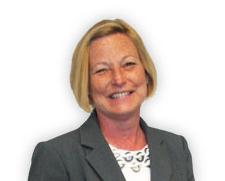 Carolyn Neumann, CPC, Senior Manager, Coding & Coverage Access at Specialty Healthcare Advisers, discusses the challenges for coding spine surgery in ambulatory surgery centers and reimbursement trends for the future. Ms. Neumann will be discussing these themes further in a complimentary webinar titled "How to Overcome the 5 Biggest Reimbursement Challenges in Total Joint & Spine Coding" on Wednesday, Oct. 16 at 11:15 a.m. CDT, sponsored by Specialty Healthcare Advisers. Learn more and register for the webinar here.
Carolyn Neumann, CPC, Senior Manager, Coding & Coverage Access at Specialty Healthcare Advisers, discusses the challenges for coding spine surgery in ambulatory surgery centers and reimbursement trends for the future. Ms. Neumann will be discussing these themes further in a complimentary webinar titled "How to Overcome the 5 Biggest Reimbursement Challenges in Total Joint & Spine Coding" on Wednesday, Oct. 16 at 11:15 a.m. CDT, sponsored by Specialty Healthcare Advisers. Learn more and register for the webinar here.
Q: Why is there so much confusion around spine coding and reimbursement?
Carolyn Neumann: Spine surgery CPT coding has undergone numerous changes and clarifications in recent years regarding how and when to report procedures. Bundling of procedures into the primary CPT code has affected not only the coding, but reimbursements by Medicare and private payers. Following AMA/CPT guidelines, particularly in spine surgeries, has become a science in itself overshadowing even confusing coverage policies and looming ICD-10 changes.
CPT code changes to spine procedure involving revisions, clarification of when a decompression is performed openly or percutaneously, and coding language that just doesn't match up with clinical realities have muddied the waters. Coding these surgeries correctly and avoiding denials has become a moving target.
Q: What are the biggest challenges for coding and billing for spine procedures in ASCs?
CN: Spine surgeries, beyond interventional procedures, are relatively new to the ASC setting of care. Medicare allows only a few procedures, simple decompressions and fusions, in the OP or ASC setting. Private payers are learning quickly the value and efficacy of spine procedures performed by experienced spine surgeons in the outpatient facility and are navigating differing state regulations, credentialing and contracting hurdles to bring spine surgeries onboard the ASC.
Coding standards that are primarily designed for Medicare complicate the coding pathways that must be adopted into outpatient/private payor contracts. Differing payment methodologies (DRG vs. APC or CPT) for OP and ASC facilities, requires that surgeons and facilities communicate and provide relevant coding pathways for services and devices they use in more complex spine surgeries.
Q: What are the biggest mistakes facilities make when coding and billing for spine and joint replacements that lead to loss in revenue?
CN: Denials and reimbursement takebacks in facilities are often tied to insufficient documentation. The new trend is for payers to deny an entire surgery because one element of the procedure is deemed investigational or not medically necessary. Not only does the surgeon need to document the surgical procedure in detail, including specifics as to what devices, biologics and technologies they use, but the documentation of the necessity of the procedure must be complete. A proactive approach to surgery decision and scheduling, with full review of the case and previous documentation from other physicians, should be a SOP for any Ortho/Spine practice. Facilities need to join with surgeons and schedulers to coordinate prior authorization, review of documentation for necessity and payer policies to avoid denials on the facility reimbursement side of the equation.
Q: Where do you see spine surgery reimbursement trends headed in the future for the ASC?
CN: New payer business models, including pay-for-performance and evidence-based medicine have resulted in bundled payments and focus on outcomes. Contracts between ASC facilities and key private payers can be sculpted to meet not only the member's medical needs but ultimately respond to new and improving technology advances. Within this more flexible business model, where contracts address reimbursements directly, there is opportunity to grow a currently slow to adapt system into a functioning medical business model.
More Articles on Spine Surgery:
5 Key Concepts for Highly Effective Spine Surgeons
Spine Surgery Coverage: How the Landscape is Changing
Will Spine Surgeons Need Non-Surgical Partners in the Future? 6 Things to Know


